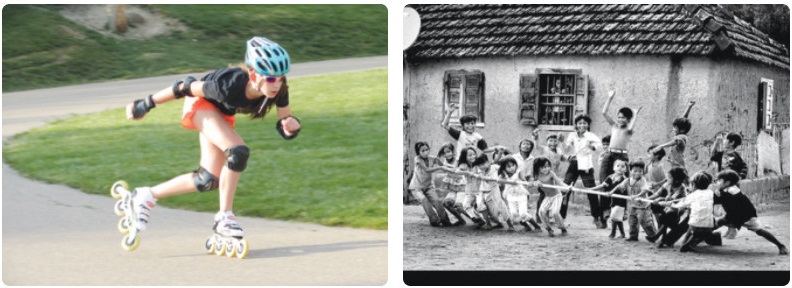Đừng bỏ lỡ những tính năng hấp dẫn của Baitap365.com
Unit 4: Life In The Past - Cuộc sống ngày xưa
Skills 1 Unit 4 trang 46 SGK tiếng Anh 9 mới
Skills 2 Unit 4 trang 47 SGK tiếng Anh 9 mới Looking back Unit 4 trang 48 SGK tiếng Anh 9 mới Project Unit 4 trang 49 SGK tiếng Anh 9 mới Communication unit 4 trang 45 SGK tiếng Anh 9 mới A Closer Look 2 Unit 4 trang 43 SGK tiếng Anh 9 mới A Closer Look 1 Unit 4 trang 42 SGK tiếng Anh 9 mới Getting Started Unit 4 trang 40 SGK tiếng Anh 9 mới Grammar: Wish at present - Unit 4 SGK Tiếng Anh 9 mới Grammar: Used to - Unit 4 SGK Tiếng Anh 9 mới Luyện tập từ vựng Unit 4 Tiếng Anh 9 mới Vocabulary - Phần từ vựng - Unit 4 tiếng Anh 9 mớiSkills 1 Unit 4 trang 46 SGK tiếng Anh 9 mới
Tổng hợp bài tập phần Skills 1 Unit 4 Trang 46 SGK Tiếng Anh 9 mới
Bài 1
Reading
Task 1. Think.
(Nghĩ.)

1. How different is the way teenagers entertain themselves nowadays compared to the past?
(Giới trẻ ngày nay giải trí khác như thế nào so với ngày xưa?)
2. What do you think might be the biggest difference?
(Sự khác biệt lớn nhất theo bạn là gì?)
Bài 2
Task 2. Read the conversation between Phong and his mother, and answer the questions.
(Đọc đoạn hội thoại của Phong và mẹ cậu ấy, và trả lời các câu hỏi.)
Phong: Mum, How did you use to entertain yourself when you were a teenager?
Mother: Well, kids in my days did a lot of physical activities in the fresh air: playing football, riding bikes, flying kites... We used nature as our playground. We also spent a lot of time with each other, playing and talking face to face, not on a screen like today.
Phong: It sounds nice, actually.
Mother: Yes. And this lifestyle kept us healthy and in shape. We didn't know about obesity. Girls didn't worry about getting fat and going on a diet.
Phong: Didn't you eat out with your friends?
Mother: No, we mostly ate at home. Sometimes we just had a snack from a street vendor.
Phong: I like street food. And did you watch much TV?
Mother: Only wealthy households had a TV. Instead, we read a lot. Unlike watching television, you had to use your imagination when you read. Ah! Now I remember - I used to keep a diary.
Phong: A diary? What did you write in it?
Mother: Lots of things: events, feelings, my private thoughts... you know.
Phong: Nowadays we just post them on Facebook.
Mother: I know. Life has changed so much, my darling.
1. Where did teenagers in the past use to play?
(Thanh thiếu niên trong quá khứ thường chơi ở đâu?)
2. How did they communicate with each other?
(Họ đã liên lạc với nhau như thế nào?)
3. What was the advantage of this lifestyle?
(Lợi ích của lối sống này là gì?)
4. Where did they mostly eat?
(Họ ăn ở đâu?)
5. What did Phong's mother say about reading?
(Mẹ của Phong nói gì về việc đọc sách?)
6. Did teenagers in the past publicise their emotions?
(Có phải thanh thiếu niên trong quá khứ thể hiện cảm xúc của họ ra ngoài?)
Bài 3
Speaking
Task 3. Discuss in groups: What do you think at teenagers' pastimes in 2?
(Thảo luận theo nhóm rồi cho biết: Bạn nghĩ gì về các trò tiêu khiển của thanh niên ngày xưa theo như bài 2?)
Pastime: riding a bicycle (đi xe đạp)
Response A: I love it. I wish I could do it more often.
(Tôi thích nó. Tôi ước tôi có thể làm vậy thường xuyên hơn.)
Response B: I think it’s inconvenient, especially when it rains. I prefer a fitness centre.
(Tôi nghĩ nó rất thuận tiện, đặc biệt là khi trời mưa. Tôi thích đến trung tâm thể dục.)
Pastimes: (Những thú tiêu khiển)
1. doing physical activities in the fresh air
(thực hiện các hoạt động thể chất trong bầu không khí trong lành)
2. using nature as your playground
(hòa mình với thiên nhiên)
3. meeting and talking face-to-face
(gặp gỡ và trò chuyện trực tiếp)
4. reading
(đọc)
5. keeping a diary
(giữ gìn nhật ký)
Bài 4
Task 4. Work in groups.
What do you think about these habits which have been long practised by children in Viet Nam? Would you like to preserve the Why/Why not?
(Làm việc theo nhóm. Bạn nghĩ gì về những thói quen sau của trẻ em ở Việt Nam? Bạn có muốn giữ những thói quen đó không? Tại sao có/ Tại sao không?)
1. hand-written homework
(viết tay bài tập về nhà)
2. playing traditional games like hide and seek, elastic-band jumping, skipping, and catch the chickens
(chơi các trò chơi truyền thống như trốn tìm, nhảy dây chun, đuổi bắt)
3. crossing one's hands in the front and bowing when you greet a person of seniority
(khoanh tay và cúi người khi chào người cao tuổi)
4. obeying your parents/teachers without talking back
(nghe theo cha mẹ / thầy cô mà không cãi lại)
Mẹo tìm đáp án nhanh
Search Google: "từ khóa + baitap365" Ví dụ: "Bài 5 trang 13 SGK Vật lí 12 baitap365